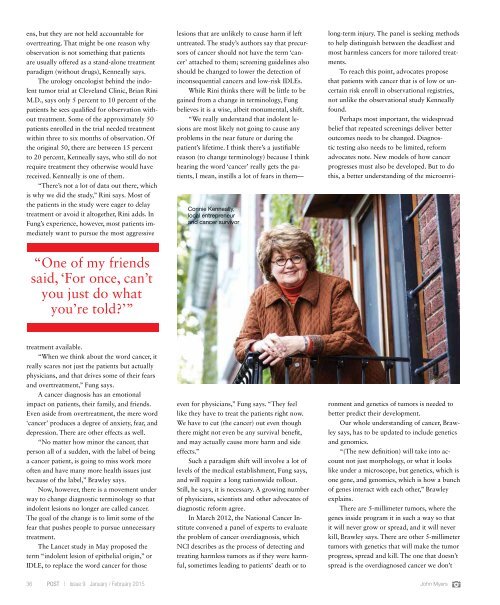You also want an ePaper? Increase the reach of your titles
YUMPU automatically turns print PDFs into web optimized ePapers that Google loves.
ens, but they are not held accountable for<br />
overtreating. That might be one reason why<br />
observation is not something that patients<br />
are usually offered as a stand-alone treatment<br />
paradigm (without drugs), Kenneally says.<br />
The urology oncologist behind the indolent<br />
tumor trial at Cleveland Clinic, Brian Rini<br />
M.D., says only 5 percent to 10 percent of the<br />
patients he sees qualified for observation without<br />
treatment. Some of the approximately 50<br />
patients enrolled in the trial needed treatment<br />
within three to six months of observation. Of<br />
the original 50, there are between 15 percent<br />
to 20 percent, Kenneally says, who still do not<br />
require treatment they otherwise would have<br />
received. Kenneally is one of them.<br />
“There’s not a lot of data out there, which<br />
is why we did the study,” Rini says. Most of<br />
the patients in the study were eager to delay<br />
treatment or avoid it altogether, Rini adds. In<br />
Fung’s experience, however, most patients immediately<br />
want to pursue the most aggressive<br />
lesions that are unlikely to cause harm if left<br />
untreated. The study’s authors say that precursors<br />
of cancer should not have the term ‘cancer’<br />
attached to them; screening guidelines also<br />
should be changed to lower the detection of<br />
inconsequential cancers and low-risk IDLEs.<br />
While Rini thinks there will be little to be<br />
gained from a change in terminology, Fung<br />
believes it is a wise, albeit monumental, shift.<br />
“We really understand that indolent lesions<br />
are most likely not going to cause any<br />
problems in the near future or during the<br />
patient’s lifetime. I think there’s a justifiable<br />
reason (to change terminology) because I think<br />
hearing the word ‘cancer’ really gets the patients,<br />
I mean, instills a lot of fears in them—<br />
Connie Kenneally,<br />
local entrepreneur<br />
and cancer survivor<br />
“One of my friends<br />
said, ‘For once, can’t<br />
you just do what<br />
you’re told?’”<br />
treatment available.<br />
“When we think about the word cancer, it<br />
really scares not just the patients but actually<br />
physicians, and that drives some of their fears<br />
and overtreatment,” Fung says.<br />
A cancer diagnosis has an emotional<br />
impact on patients, their family, and friends.<br />
Even aside from overtreatment, the mere word<br />
‘cancer’ produces a degree of anxiety, fear, and<br />
depression. There are other effects as well.<br />
“No matter how minor the cancer, that<br />
person all of a sudden, with the label of being<br />
a cancer patient, is going to miss work more<br />
often and have many more health issues just<br />
because of the label,” Brawley says.<br />
Now, however, there is a movement under<br />
way to change diagnostic terminology so that<br />
indolent lesions no longer are called cancer.<br />
The goal of the change is to limit some of the<br />
fear that pushes people to pursue unnecessary<br />
treatment.<br />
The Lancet study in May proposed the<br />
term “indolent lesion of epithelial origin,” or<br />
IDLE, to replace the word cancer for those<br />
even for physicians,” Fung says. “They feel<br />
like they have to treat the patients right now.<br />
We have to cut (the cancer) out even though<br />
there might not even be any survival benefit,<br />
and may actually cause more harm and side<br />
effects.”<br />
Such a paradigm shift will involve a lot of<br />
levels of the medical establishment, Fung says,<br />
and will require a long nationwide rollout.<br />
Still, he says, it is necessary. A growing number<br />
of physicians, scientists and other advocates of<br />
diagnostic reform agree.<br />
In March 2012, the National Cancer Institute<br />
convened a panel of experts to evaluate<br />
the problem of cancer overdiagnosis, which<br />
NCI describes as the process of detecting and<br />
treating harmless tumors as if they were harmful,<br />
sometimes leading to patients’ death or to<br />
long-term injury. The panel is seeking methods<br />
to help distinguish between the deadliest and<br />
most harmless cancers for more tailored treatments.<br />
To reach this point, advocates propose<br />
that patients with cancer that is of low or uncertain<br />
risk enroll in observational registries,<br />
not unlike the observational study Kenneally<br />
found.<br />
Perhaps most important, the widespread<br />
belief that repeated screenings deliver better<br />
outcomes needs to be changed. Diagnostic<br />
testing also needs to be limited, reform<br />
advocates note. New models of how cancer<br />
progresses must also be developed. But to do<br />
this, a better understanding of the microenvironment<br />
and genetics of tumors is needed to<br />
better predict their development.<br />
Our whole understanding of cancer, Brawley<br />
says, has to be updated to include genetics<br />
and genomics.<br />
“(The new definition) will take into account<br />
not just morphology, or what it looks<br />
like under a microscope, but genetics, which is<br />
one gene, and genomics, which is how a bunch<br />
of genes interact with each other,” Brawley<br />
explains.<br />
There are 5-millimeter tumors, where the<br />
genes inside program it in such a way so that<br />
it will never grow or spread, and it will never<br />
kill, Brawley says. There are other 5-millimeter<br />
tumors with genetics that will make the tumor<br />
progress, spread and kill. The one that doesn’t<br />
spread is the overdiagnosed cancer we don’t<br />
36 <strong>POST</strong> | Issue 9 <strong>January</strong> / <strong>February</strong> <strong>2015</strong><br />
John Myers


